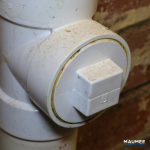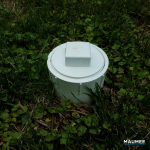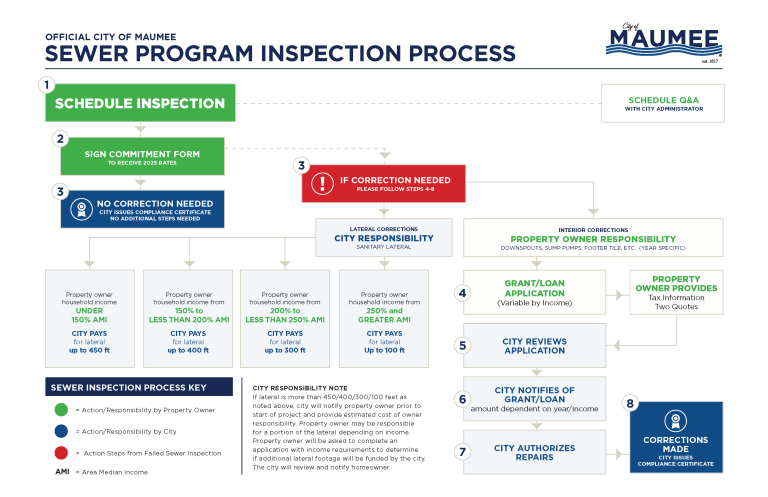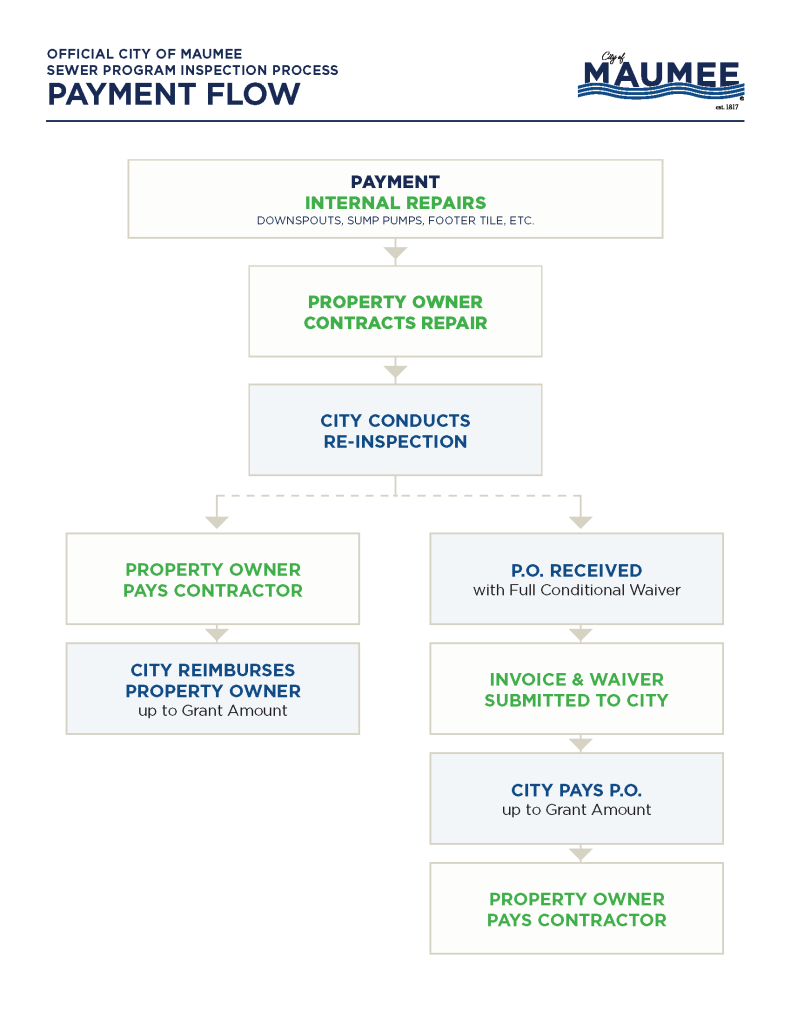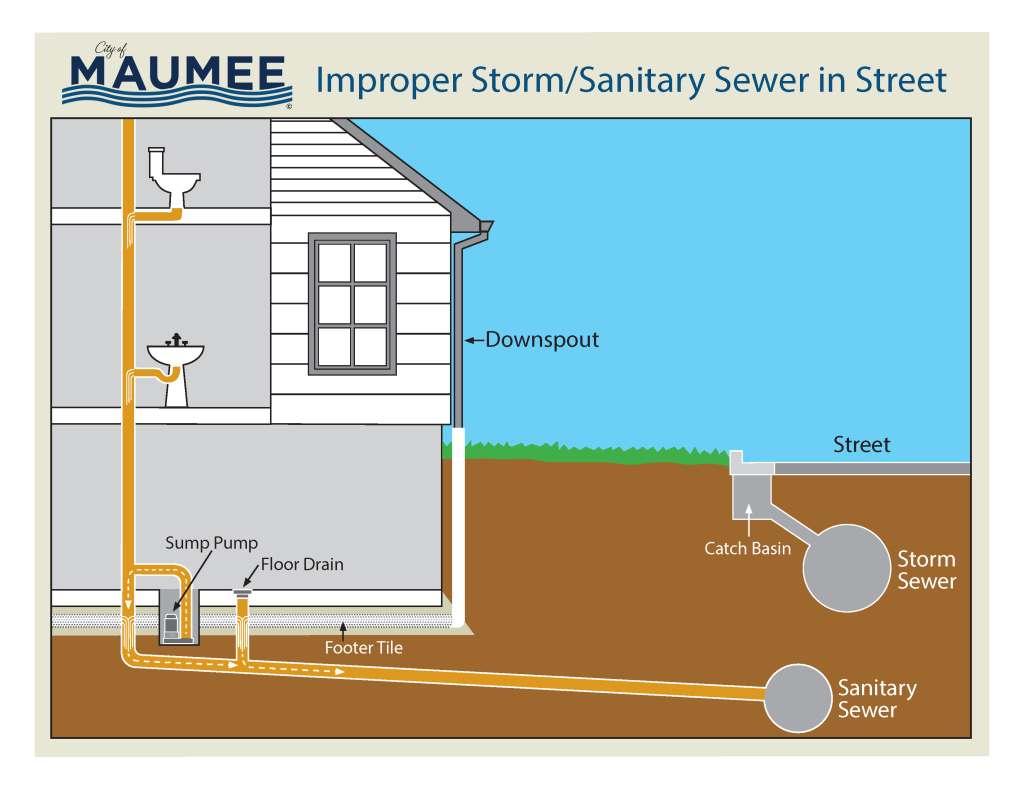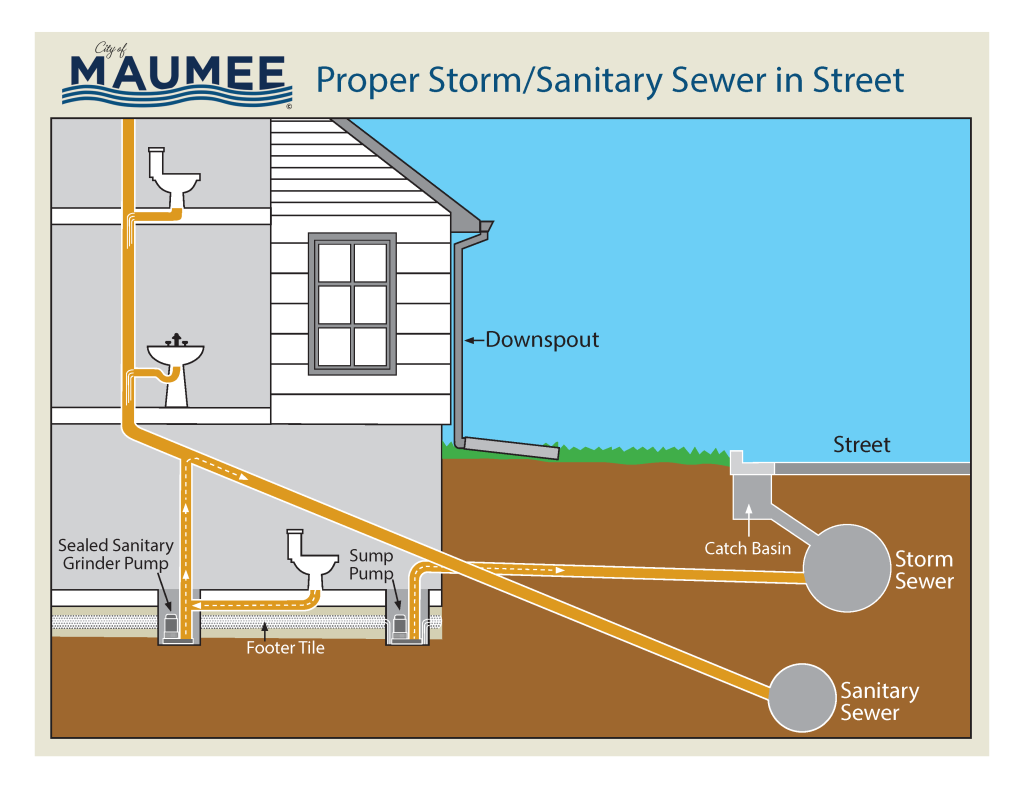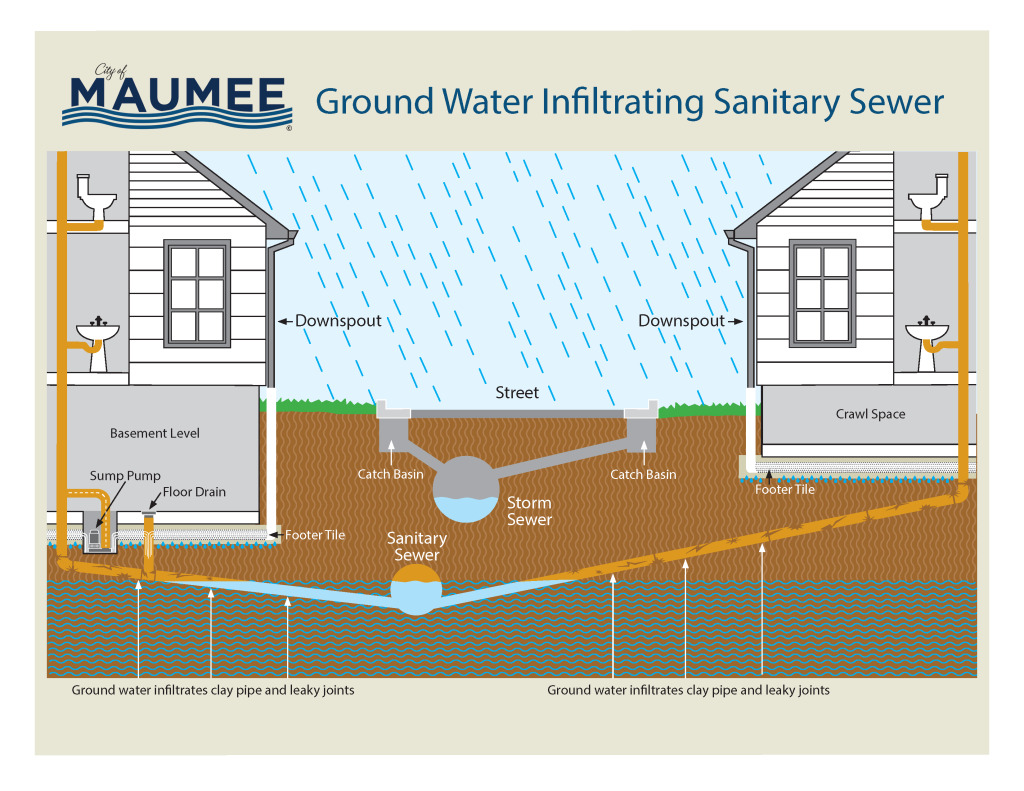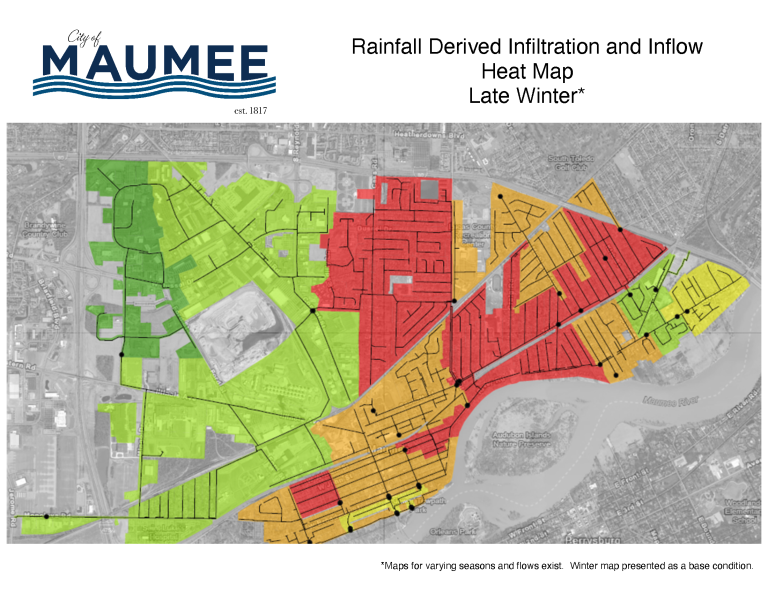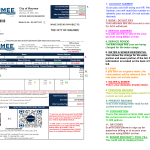Sanitary Sewer Separation Project
Sustainable Solutions: The Proposal to Eliminate Sanitary Sewer Overflows
Data indicates that a substantial amount of inflow and infiltration in the city’s sanitary system comes from private laterals, footer drains, downspouts, and sump pumps on residential properties. The City of Maumee is offering a comprehensive proposal to repair the system and effectively eliminate sanitary sewer overflows while avoiding the construction of sanitary sewer storage facilities. This program covers the costs to property owners through the existing sewer rate structure.
For Better Understanding, please review this Official City of Maumee Sewer Program Inspection Process Flowchart
Since the City is expected to fund only 600 to 700 remediations per calendar year, we will offer contracts for future years at the 2025 grant amount, provided that a property owner signs a non-revocable agreement to complete the necessary repairs. This offer is also contingent on court or state legislative approval to spend public money on private properties. For example: A property owner who finds they are 925th on the list of applying for and completing sewer inspections will be offered a commitment contract for the 2026 year or subsequent years thereafter holding the 2025 grant or loan amount if applicable. If the property owner fails to honor said contract the grant amount resets to the year in which repairs are made.
When planning repair work inside the home, please consider the following:
- A free City sewer inspection shall be required to determine the extent of repairs needed.
- Two or more repair quotes for internal work must be submitted and approved by the City Service Department.
- The City must pay the property owner either through “proof of contractor payment” or through a contractor-signed “full conditional waiver of lien”. (This protects the property owner).
- Grants, if applicable, (work already completed as of March 1, 2025), will be retroactive to June 17, 2024, at a maximum of $120/lineal ft for laterals for those with less than 200% AMI for emergencies.
- AMI (Area Median Income) for purposes of these calculations shall mean Adjusted Gross Income AGI, minus rental and other business losses or expenses.
One-on-One Meeting with City Administrator:
Property owners can schedule a one-on-one meeting with City Administrator Patrick Burtch to ask specific questions about repairs to their properties, grants the city is offering, and/or the procedures to follow to ensure your home complies.
Funding Sewer Lateral Lining Work on Private Property:
The City will pay for up to 200 feet of repairs for a private sanitary sewer lateral for residents earning less than 250% of the Area Median Income (AMI), or approximately $200,000 annually. Additionally, the program will cover repairs up to 100 feet of private sanitary sewer lateral for residents with incomes exceeding 250% AMI.
Property owners with combined household incomes ranging from $79,203 or less to $198,008 are eligible for a 100 percent grant in the program’s first year (2025). Higher income earners, or those making more than $198,008, will receive a grant of up to 80 percent in the first year. In subsequent years, the grant money will shift to a sliding scale, with homeowners contributing a greater portion of the cost each year. A low-interest loan will also be available, however, to cover those costs.
The portion of the plan that calls for using public funds for work on private property is contingent on court approval. Maumee Finance and Economic Development Committee endorsed the plan, which council approved at the November 18 meeting. In addition, council approved legislation declaring damaged laterals a nuisance, which the committee also endorsed. The action is necessary to support using public funds for that work.
Sewer Lateral Lining Work Will Begin in the Uptown District:
The Uptown District is the first area to receive sewer lining work. To aid those property owners and investors with residential properties or commercial buildings within the historic and/ or uptown district that are most in need, the City of Maumee is replacing or lining substandard sanitary sewer laterals at no additional cost to the property owner within the following caveats: A sliding cost year scale every year thereafter for repair, replacement, and/or lining of substandard sewer laterals is applied. The City will also provide grants for sewer work within principal property structures provided the City can achieve “public purpose” approval through the courts or legislative action to spend public funds on private property.
Please Note: No funding will be provided for commercial buildings unless they are located in the uptown district and less than 15,000 square feet, or residential buildings containing 3 or more units.
Overview: How Sewer System Repairs Are Funded in Maumee
The City will spend approximately $81.2 million to line the sewer main lines and laterals on private property and $20 million will be offered through grants and loans to residents to repair footer tiles, downspouts, and sump pumps. Work on those projects will begin in February 2025.
The city nominated our community for $81.2 million in funds from the Ohio EPA for a water pollution control revolving low-interest loan to cover the sanitary sewer lining work.
An additional $20 million will be allocated to lining projects in 2030 in the areas west of Key Street and north of the former St. Luke’s Hospital. That work would include lining the sewer main and laterals on private properties.
To View the Sanitary Sewer Overflow Remediation Policy (updated Feb. 4th, 2025):
Sanitary Sewer Overflow (SSO) - City Remediation Solutions Revised 3.26.25
Historical Perspective:
Although the City did separate sanitary and storm sewers in the 80’s and 90’s, it failed to eliminate regulators that continually served as a connection between the storm and sanitary sewers. The City also failed to fully recognize the true impact of private property footer drains and leaking clay sanitary sewer leads that connect to the City’s sanitary sewer mains.
As a result, multiple pumps were used to manage the situation by dumping raw sewage into the City’s stormwater system. City staff also manually discharged sewage directly from the Birch Street pump station into the river. Furthermore, City staff failed to report the illegal actions and actively authored multiple reports stating that few if any events had happened even though clear actions were taken to pump active sewage into the river for decades. However, that reporting never happened, and discharges continued without proper permits and reporting. These false actions were also reported to the EPA in July 2020.
As a result of self-reporting the violation, the state issued a “Director’s Findings and Orders” requiring the City of Maumee to stop illegally discharging sewage into the Maumee River. It also stipulates and requires massive testing and study of the problem.
In December 2021, the City of Maumee approved a nearly $900,000 contract Stantec, a global engineering firm specializing in consulting and engineering services, to study the city’s sewer system. Immediate work also began to repair, reline, and replace sewer lines on streets and alleys and, several catch basins in commercial parking lots that were incorrectly tied to the sanitary system were corrected.
Mandates by the EPA have also required the following action:
1. Sewer Evaluation Study: Specifies major tasks associated with further authoring a Sewer System Evaluation Study (“SSES”)
2. Public Notification Plan: Inform the public of all sanitary overflow locations, signs, postings, and inserts as applicable. This plan remains ongoing.
3. Emergency Response Plan: Develop procedures for emergency response to surcharge events.
4. Capacity, Management, Operation, and Maintenance Program: Mitigate and stop sanitary overflows as soon as possible for all parts of the sanitary collection system. This program remains ongoing.
5. Sewer System Evaluation Study (“SSES”): Identify sources and quantities of clear water infiltration and inflow (“I & I”) entering the sanitary sewer system and identifies all feasible, cost-effective actions needed to eliminate or minimize excessive I&I entering the sanitary sewer system that causes or contributes to sanitary sewer overflows (SSOs) and water in basements.
The 2024 SSES report has been uploaded to OEPA. You can view/download the file here:
These are the final ‘Findings and Orders” provided by the Ohio EPA.
Citizen Questions & Concerns:
We thank the citizens of Maumee who are engaged and asking questions by attending the city-hosted roundtable discussions, which began July 31 and will continue through August 29. Residents also attended meetings hosted by Maumee Council Member Phil Leinbach.
Hundreds have participated in these discussions and the input from attendees has been compiled and carefully reviewed.
To view citizen questions and answers click here:
To view the suggestions that citizens have brought forward to address the issue click here:
In this episode of the Strong Towns Podcast, Chuck Marohn addresses the issue facing Maumee as he explains the history of sewer infrastructure, how the Clean Water Act affects cities and the very limited options that cities have to handle this kind of challenge. He also points out that the Strongest Town Contest is about celebrating cities that are working hard to improve, rather than finding cities that are perfect. Just because Maumee is facing this challenge does not mean that it’s a failure — and it’s not alone in this struggle, either. All cities are either facing this challenge, too, or will be facing it in the near future. That’s the consequence of decades of unproductive growth.
Sanitary Sewer Inspections FAQ's
Yes, an adult must be present at the time of inspection.
Sanitary sewer Inspections take about an hour.
You can schedule a sanitary sewer inspection on the City of Maumee website:
Utilize the form below.
Before the sewer inspectors arrive, please remove the Sewer Clean Out cap (as shown in the photo below). Clean outs may be located outside, in the basement, or in the crawlspace. Ensure that our sewer staff has access to both the crawlspace and/or basement if applicable.
The sanitary sewer inspections will be conducted by City of Maumee sewer staff.
During our sewer inspection, our professionals will focus on two main aspects:
1. Sanitary Sewer Connections: Our Sewer Inspectors are trained to identify all connections to the sewer system. This includes connections such as floor drains or subpumps connected to the sanitary sewer system.
2. Condition of Your Lateral Pipe: The lateral pipe connects your property to the City sanitary sewer main. Our inspectors will evaluate its condition to ensure its functioning properly.
